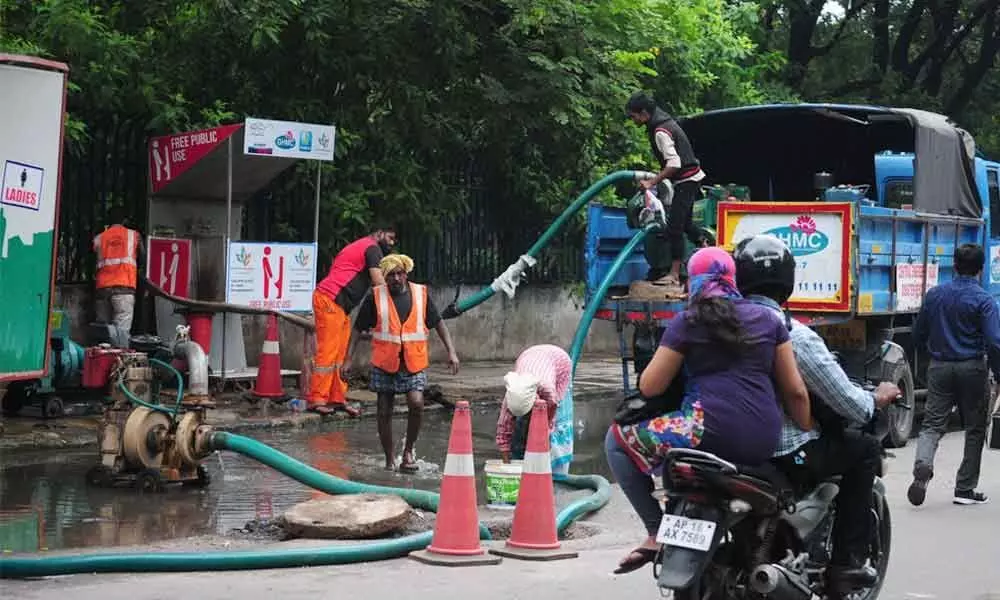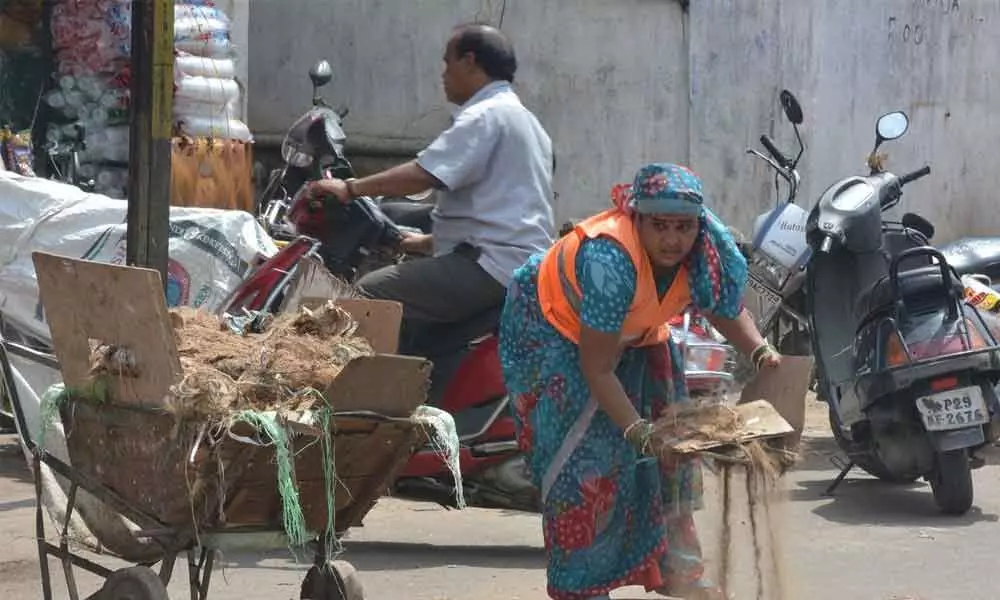Hyderabad: Safety goes for a toss
Sanitation staff made to discharges duties sans safety measures
• Suspended particle matter is a major proven health risk to citizens
• Sanitation staff sweep roads giving rise to high levels of particle matter
• They carry out this daily routine work without any masks, gloves and shoes
• Prone to frequent illnesses they are not provided proper treatment at the ESI Hospital
Hyderabad: Close to 18,500 sanitation workers that includes both outsourcing and permanent workers, help to clear more than 5,000 metric tonnes of garbage and debris from the city. However, the GHMC sanitation workers unions and the workers allege that the officials including the health department were not doing enough to ensure their protection and safety.
Revathi Devi (name changed), a contractual worker, wearing a fluorescent orangejacket over a saree, sweeps road and picks up dry leaves, trash, glass pieces, bottles, plastic material, dust particles. dry and wet waste with two pieces of cardboards and dumps it into a tricycle at the end of the street.This is her daily routine job working in flying dust particles and pollution released from passing vehicles. Other than the fluorescent jacket, there is no safety gear like masks, gloves and boots for her protection.
When these workers sweep the roads, the particle matter rises in the air and its levels reach above PM 2.5 which is considered very harmful to the health. There is no study on the PM levels these sanitation staff carry out their routine work.
Meanwhile, lack of safety is not only an issue faced by the workers responsible for the collection of garbage but similar is the situation of those who clean the drainage and the sewage lines. A group of workers near Indira Park were seen cleaning the sewage without any safety gear like mask, gloves and shoes. While an even worse situation was seen in Sri Nagar Colony, where two of the workers entered the manhole without a mask and glove. Also, they remove their clothes so that they don't get spoiled.
While the GHMC officials claim that the safety equipment is provided to the workers, what is seen on the roads negates their claims. Not even a single worker was seen with any of the equipment, except for the jackets.
Speaking to The Hans India, Dr Amar L, Chief Medical Officer of Health and AddlDirector of Medical and Health services, said, "All the safety equipment including the gloves and masks are being provided to the sanitation workers. They are also sent to medical check-ups every 6 months."
Denying the statement, Shankar Akula, General Secretary of Bhagyanagar Municipal Employees Union, said, "The workers start clearing garbage early morning from their designated areas without any safety gear."
He further said, "There are no safety measures for the workers doing duty on the roads. We can comprehend the gravity by the fact that more than half a dozen sanitation workers lost their lives last year."
"The workers either don't or very rarely receive safety kits that contain sturdy gloves, masks and safety jackets. They are prone to injury almost every day as they have to manually transfer trash to the tricycle which, at times, include broken bottles, sanitary napkins, soiled diapers, other sharp objects and rotten food. The workers are given flimsy slippers to wear instead of shoes so, at times, thorns and pieces of glass pierce their feet," he added.
It is obvious that workers would get sick due to occupational hazard working in unhygienic conditions. However, workers face apathy at the ESI hospitals where they are not treated properly. Most of the sanitation workers are denied advanced treatment. Telangana Outsourcing Employees Welfare Association president Mohd Haji Ali said, "Though the permanent and contract sanitation workers are provided insurance cover, but their concern is not getting proper treatment at the ESI hospital."
The other major issue was that the workers were not paid proper and regular salaries. The actual salary for these workers is Rs 12,000 per month. While the permanent workers get only around Rs 7,000, the contract workers don't get their pay for two to three months.
Similar is the condition at transfer stations
There are around 2,049 contract employees including drivers, labours and security guard and only 156 are permanent employees.
When THI visited the transfer stations, a huge malodorous smell encompassed the entire area. Many workers were seen working without masks, gloves, shoes and many without the jackets as well.
















